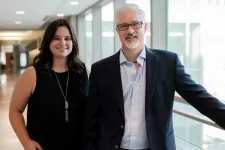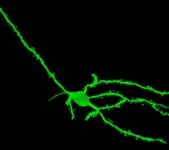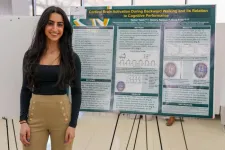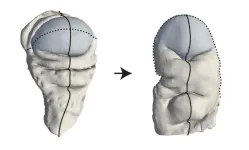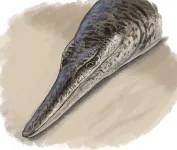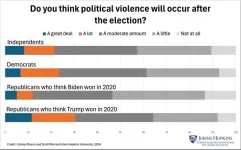(Press-News.org) Most people wouldn’t think twice after seeing sugar spilled on a counter. But for someone with a history of cocaine use, this visual cue could trigger powerful associations with their past drug use and a compulsive urge to seek the drug.
Certain circuits within the brain help to form natural associations between one’s experiences and the context in which those experiences occur. These associations play a critical role in the orchestration of adaptive learning. When addictive substances are introduced, this coupling mechanism can be hijacked so that the drug-taking behavior becomes associated with cues, such as people, places or situations, linked to the drug experience. These drug-context associations become critical factors that contribute to one’s relapse vulnerability.
In a recent publication in Nature Communications, a research team at the Medical University of South Carolina (MUSC) led by Department of Neuroscience chairman Christopher Cowan, Ph.D., identified a mechanism by which these drug-context associations are regulated by a small population of cells in the nucleus accumbens. The nucleus accumbens is where drug-dependent dopamine increases are associated with their rewarding effects. The MUSC team sought to understand how a regulatory factor, neuronal PAS domain protein 4, or NPAS4, controls the formation and maintenance of drug-context associations. This study also revealed how NPAS4 affects future drug-taking using a mouse model.
“These drug-context associations become future triggers for drug seeking,” explained Cowan, highlighting why it’s important that scientists understand how these associations are formed.
The MUSC team included former graduate student Brandon Hughes, Ph.D., current postdoctoral fellow Jessica Huebschman, Ph.D., and Makoto Taniguchi, Ph.D., an assistant professor in the Department of Neuroscience.
For individuals with a substance use disorder, experiencing a context or certain cues that remind them of drug use can hinder abstinence and promote a return to active drug use.
The MUSC researchers identified a small group of cells within the nucleus accumbens that appear essential for drug-context associations. They found that the percentage of these NPAS4-expressing neurons increased when exposed to cocaine. NPAS4 is a transcription factor that helps to regulate how a cell responds to neuronal activity induced by various stimuli, including drugs. The MUSC team looked specifically at NPAS4 in the nucleus accumbens because this region is known to regulate motivation and reward-associated learning.
After identifying this small population of neurons that expressed NPAS4 in response to cocaine, the researchers investigated the behavioral effects of inhibiting these neurons. Without the activity of these cells, mice no longer displayed drug-seeking behavior when put in the context they associated with cocaine.
“NPAS4 is a molecule in the brain that is trying very hard to keep systems functioning as normally as possible,” said Cowan. “But drugs are tapping into this and using it to their advantage.”
Next, the team wanted to understand how NPAS4 helps to form drug-context associations. To do so, they looked at NPAS4 within the two major types of cells in the nucleus accumbens – D1 and D2 dopamine receptor-expressing neurons. Dopamine, a major neurotransmitter in the brain, plays a crucial role in reward-associated learning.
“Classically, D1 neurons tend to promote drug-seeking behavior, while D2 neurons tend to oppose it,” explained Cowan. “So, it's a bit of a Yin and Yang, a push and the pull, of this motivational circuit. When an animal encounters a drug-associated context, it's going to activate D1 and D2, but D1 typically wins.”
Surprisingly, the study showed that NPAS4 in D2 neurons, but not D1, is necessary for context-associated drug seeking. At first, this finding appeared somewhat counterintuitive, said Cowan. How can this protein promote drug-seeking behavior by acting in the cells that typically oppose it?
If D2 neurons act as a brake for drug taking, NPAS4 effectively weakens those brakes. As a result, drug-context associations are strengthened, and the likelihood of further drug-seeking behaviors may increase.
“Drugs are presumably doing multiple things,” said Cowan. “Obviously, they're strengthening and forming the context memory, but they're also suppressing the ability of the brain to oppose this association.”
If researchers can better understand the factors contributing to drug-context associations, they will be able to identify new therapeutic targets to reduce a return to drug use.
“Ultimately, the long-range goal is to understand how NPAS4 mediates these effects to aid in the design of potential therapeutics,” explained Cowan.
# # #
Research reported in this press release was supported by the National Institute on Drug Abuse at the National Institutes of Health under award numbers F31DA048557, T32DA007288, R01DA032708 and P50DA046373. The content is solely the responsibility of the authors and does not necessarily represent the official views of the National Institutes of Health.
About MUSC
Founded in 1824 in Charleston, MUSC is the state’s only comprehensive academic health system, with a unique mission to preserve and optimize human life in South Carolina through education, research and patient care. Each year, MUSC educates more than 3,200 students in six colleges – Dental Medicine, Graduate Studies, Health Professions, Medicine, Nursing and Pharmacy – and trains more than 900 residents and fellows in its health system. MUSC brought in more than $300 million in research funds in fiscal year 2023, leading the state overall in research funding. MUSC also leads the state in federal and National Institutes of Health funding. For information on academic programs, visit musc.edu.
As the health care system of the Medical University of South Carolina, MUSC Health is dedicated to delivering the highest-quality and safest patient care while educating and training generations of outstanding health care providers and leaders to serve the people of South Carolina and beyond. Patient care is provided at 16 hospitals (includes owned or governing interest), with approximately 2,700 beds and five additional hospital locations in development, more than 350 telehealth sites and nearly 750 care locations situated in all regions of South Carolina. In 2024, for the 10th consecutive year, U.S. News & World Report named MUSC Health University Medical Center in Charleston the No. 1 hospital in South Carolina. To learn more about clinical patient services, visit muschealth.org.
MUSC has a total enterprise annual operating budget of $5.9 billion. The 31,000 MUSC family members include world-class faculty, physicians, specialty providers, scientists, students, contract employees, affiliates and care team members who deliver groundbreaking education, research and patient care.
END
Investigating a critical factor for promoting drug-context associations and relapse
Scientists at the Medical University of South Carolina identify how cocaine triggers a specific protein in the brain to hijack normal brain circuitry and promote further drug taking.
2024-08-09
ELSE PRESS RELEASES FROM THIS DATE:
New material for optically-controlled magnetic memory discovered
2024-08-09
Researchers at the University of Chicago Pritzker School of Molecular Engineering (PME) have made unexpected progress toward developing a new optical memory that can quickly and energy-efficiently store and access computational data. While studying a complex material composed of manganese, bismuth and tellurium (MnBi2Te4), the researchers realized that the material’s magnetic properties changed quickly and easily in response to light. This means that a laser could be used to encode information ...
Detroit research team to investigate fear of falling in MS patients
2024-08-09
DETROIT — Taylor Takla, a Ph.D. candidate in the translational neuroscience program in Wayne State University’s School of Medicine, recently received a two-year, $96,812 F31 grant from the Eunice Kennedy Shriver National Institute of Child Health and Human Development of the National Institutes of Health to study fear of falling in those with multiple sclerosis (MS).
The grant, “Investigating Fear of Falling in Multiple Sclerosis: An Interplay of Neural, Motor, Cognitive, and Psychological Factors,” aims to address a major public health concern in persons with MS that results in increased falls, decreased physical activity and ...
A new mechanism for shaping animal tissues
2024-08-09
A key question that remains in biology and biophysics is how three-dimensional tissue shapes emerge during animal development. Research teams from the Max Planck Institute of Molecular Cell Biology and Genetics (MPI-CBG) in Dresden, Germany, the Excellence Cluster Physics of Life (PoL) at the TU Dresden, and the Center for Systems Biology Dresden (CSBD) have now found a mechanism by which tissues can be “programmed” to transition from a flat state to a three-dimensional shape. To accomplish this, the researchers looked at the development of the fruit fly Drosophila and its ...
New ancient marine crocodile from time of dinosaurs provides insight into the groups lifestyle and diversity
2024-08-09
New ancient marine crocodile from time of dinosaurs provides insight into the groups lifestyle and diversity
A newly discovered species of marine crocodile from 135 million years ago described from Germany
An international team of scientists, including researchers from Germany and the UK, have described a new species of ancient marine crocodile, Enalioetes schroederi. Enalioetes lived in the shallow seas that covered much of Germany during the Cretaceous Period, approximately 135 million years ago.
This ...
CMU researchers outline promises, challenges of understanding AI for biological discovery
2024-08-09
Machine learning is a powerful tool in computational biology, enabling the analysis of a wide range of biomedical data such as genomic sequences and biological imaging. But when researchers use machine learning in computational biology, understanding model behavior remains crucial for uncovering the underlying biological mechanisms in health and disease.
In a recent article in Nature Methods, researchers at Carnegie Mellon University's School of Computer Science propose guidelines that outline pitfalls and opportunities for using interpretable ...
Japan SciCom Forum 2024 comes to Fukuoka on October 22-23
2024-08-09
On October 22 and 23, the sixth Japan SciCom Forum Conference (JSF 2024) will be held at Kyushu University's Ito Campus. Fukuoka will become the third city, following Tokyo and Okinawa, to welcome specialists in science communication from Japan and around the world.
JSF 2024 will bring together a diverse group of science communicators, writers, researchers, and journalists, along with experts from overseas. The conference is open to anyone involved in sharing research findings internationally, as well as those interested in science communication, public outreach, and engagement.
This year's JSF will explore a wide range of topics, including ...
Organic farms certified by peers display higher product diversity
2024-08-09
In Brazil, a study compared two systems of organic product certification implemented in São Paulo state. One system involves conventional certification by auditors accredited by the Ministry of Agriculture and the National Institute of Metrology, Quality and Technology (INMETRO). The other is peer-to-peer certification.
The study, reported in an article published in the journal Organic Agriculture, suggests that peer-to-peer certification adds the virtue of agrobiodiversity to organic farming in light of the significantly larger number of products offered by farms with this type of certification. “This ...
Republicans who believe Trump won in 2020 expect significant chaos in November
2024-08-09
Republicans who believe Donald Trump won the 2020 election are anticipating a much more chaotic election cycle this year than other GOP, Democratic, and independent voters, according to new polling data from the SNF Agora Institute at Johns Hopkins University.
Among Republican respondents who believe President Joe Biden did not lawfully win the 2020 election, about 31% think that either “a lot” or “a great deal” of political violence will occur after the 2024 election—compared to 24% of Democratic voters, 21% of independents and just 12% of GOP voters who acknowledge Biden’s victory four years ago, the poll found.
In ...
Memory problems in old age linked to a key enzyme, study in mice finds
2024-08-09
UNIVERSITY PARK, Pa. — Everyone has moments of forgetfulness from time to time, especially as we get older. But older adults don’t just have difficulty remembering new information. They also have a harder time modifying those memories when new details emerge. Yet, little is known about the mechanisms behind memory updating and how those mechanisms go awry with age.
A team of researchers from Penn State has identified an enzyme that contributes to age-related impairments in memory updating. When blocked, older mice were better able to incorporate new information and performed similarly ...
National study shows how internal medicine chief residency has changed over 20 years
2024-08-09
New research shows how the chief resident position in academic internal medicine residency programs has evolved over the past 20 years, revealing how the position has changed, the types of careers these individuals pursue, and improvement in gender representation.
These findings, published this summer by the American Journal of Medicine, stem from a 20-year multicenter study that involved the University of Colorado Internal Medicine Residency Program. CU Department of Medicine faculty member William Turbyfill, MD, was among the study’s site investigators.
Turbyfill, who practices in the Veterans Affairs ...
LAST 30 PRESS RELEASES:
Science reveals why you can’t resist a snack – even when you’re full
Kidney cancer study finds belzutifan plus pembrolizumab post-surgery helps patients at high risk for relapse stay cancer-free longer
Alkali cation effects in electrochemical carbon dioxide reduction
Test platforms for charging wireless cars now fit on a bench
$3 million NIH grant funds national study of Medicare Advantage’s benefit expansion into social supports
Amplified Sciences achieves CAP accreditation for cutting-edge diagnostic lab
Fred Hutch announces 12 recipients of the annual Harold M. Weintraub Graduate Student Award
Native forest litter helps rebuild soil life in post-mining landscapes
Mountain soils in arid regions may emit more greenhouse gas as climate shifts, new study finds
Pairing biochar with other soil amendments could unlock stronger gains in soil health
Why do we get a skip in our step when we’re happy? Thank dopamine
UC Irvine scientists uncover cellular mechanism behind muscle repair
Platform to map living brain noninvasively takes next big step
Stress-testing the Cascadia Subduction Zone reveals variability that could impact how earthquakes spread
We may be underestimating the true carbon cost of northern wildfires
Blood test predicts which bladder cancer patients may safely skip surgery
Kennesaw State's Vijay Anand honored as National Academy of Inventors Senior Member
Recovery from whaling reveals the role of age in Humpback reproduction
Can the canny tick help prevent disease like MS and cancer?
Newcomer children show lower rates of emergency department use for non‑urgent conditions, study finds
Cognitive and neuropsychiatric function in former American football players
From trash to climate tech: rubber gloves find new life as carbon capturers materials
A step towards needed treatments for hantaviruses in new molecular map
Boys are more motivated, while girls are more compassionate?
Study identifies opposing roles for IL6 and IL6R in long-term mortality
AI accurately spots medical disorder from privacy-conscious hand images
Transient Pauli blocking for broadband ultrafast optical switching
Political polarization can spur CO2 emissions, stymie climate action
Researchers develop new strategy for improving inverted perovskite solar cells
Yes! The role of YAP and CTGF as potential therapeutic targets for preventing severe liver disease
[Press-News.org] Investigating a critical factor for promoting drug-context associations and relapseScientists at the Medical University of South Carolina identify how cocaine triggers a specific protein in the brain to hijack normal brain circuitry and promote further drug taking.
